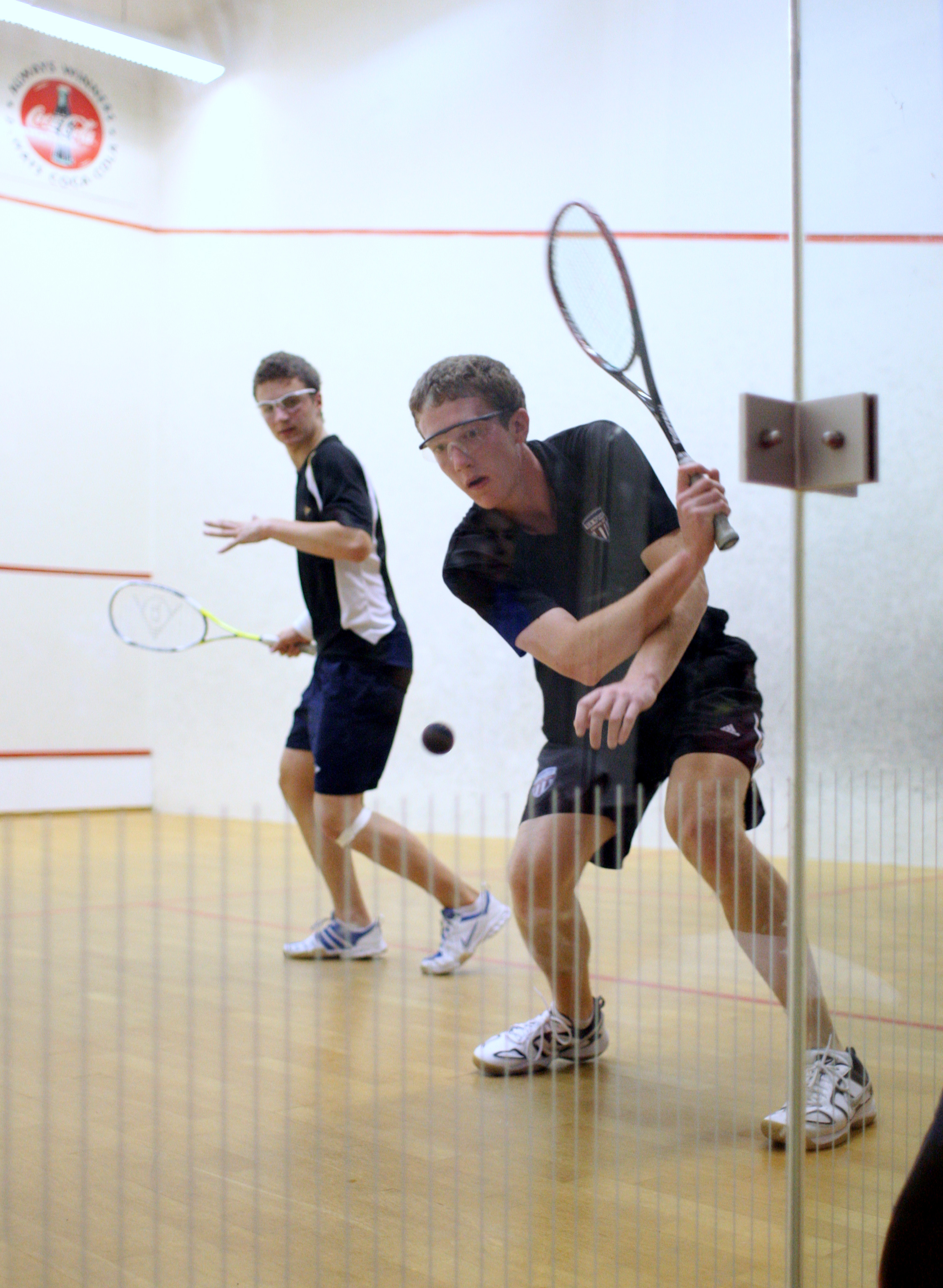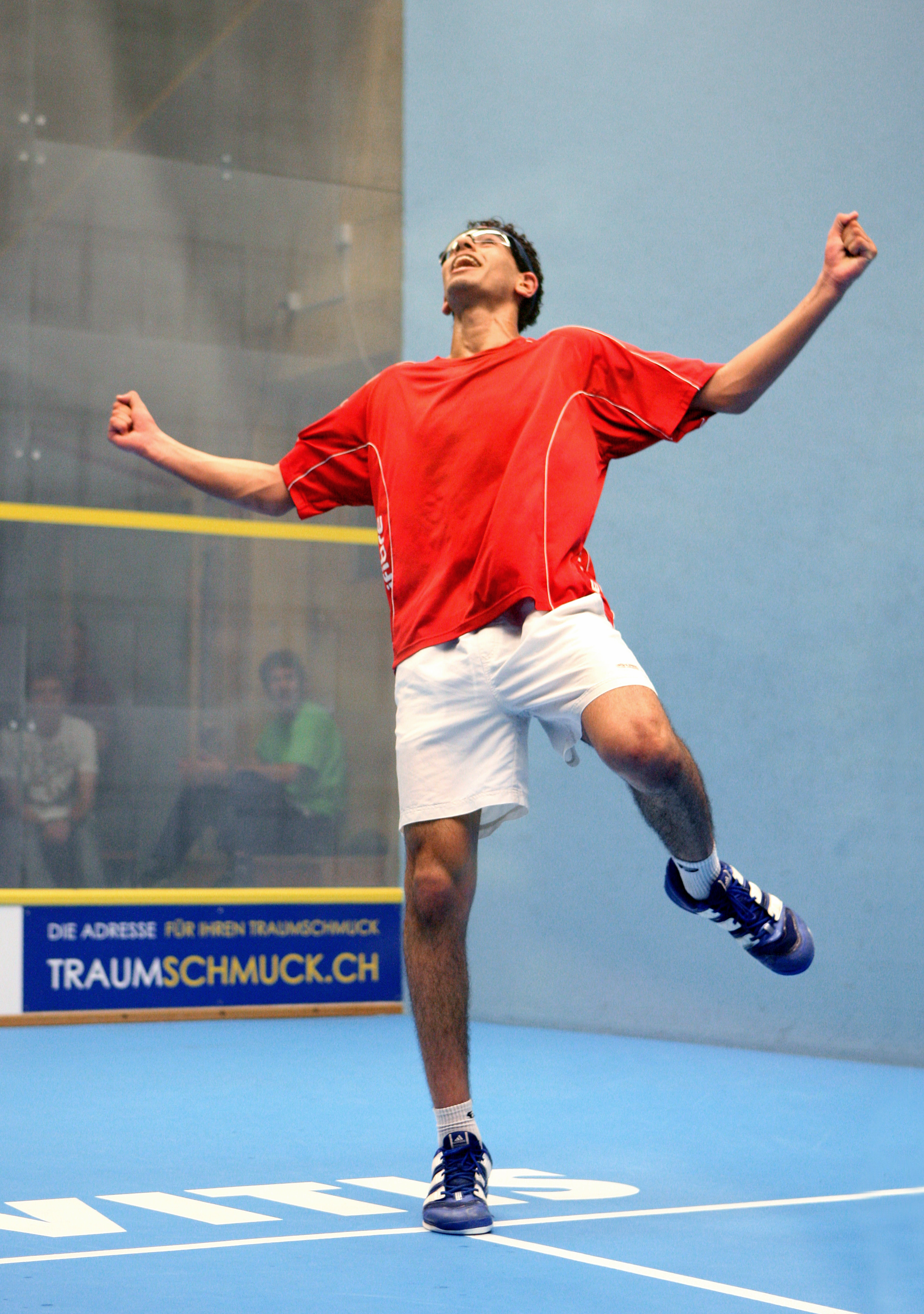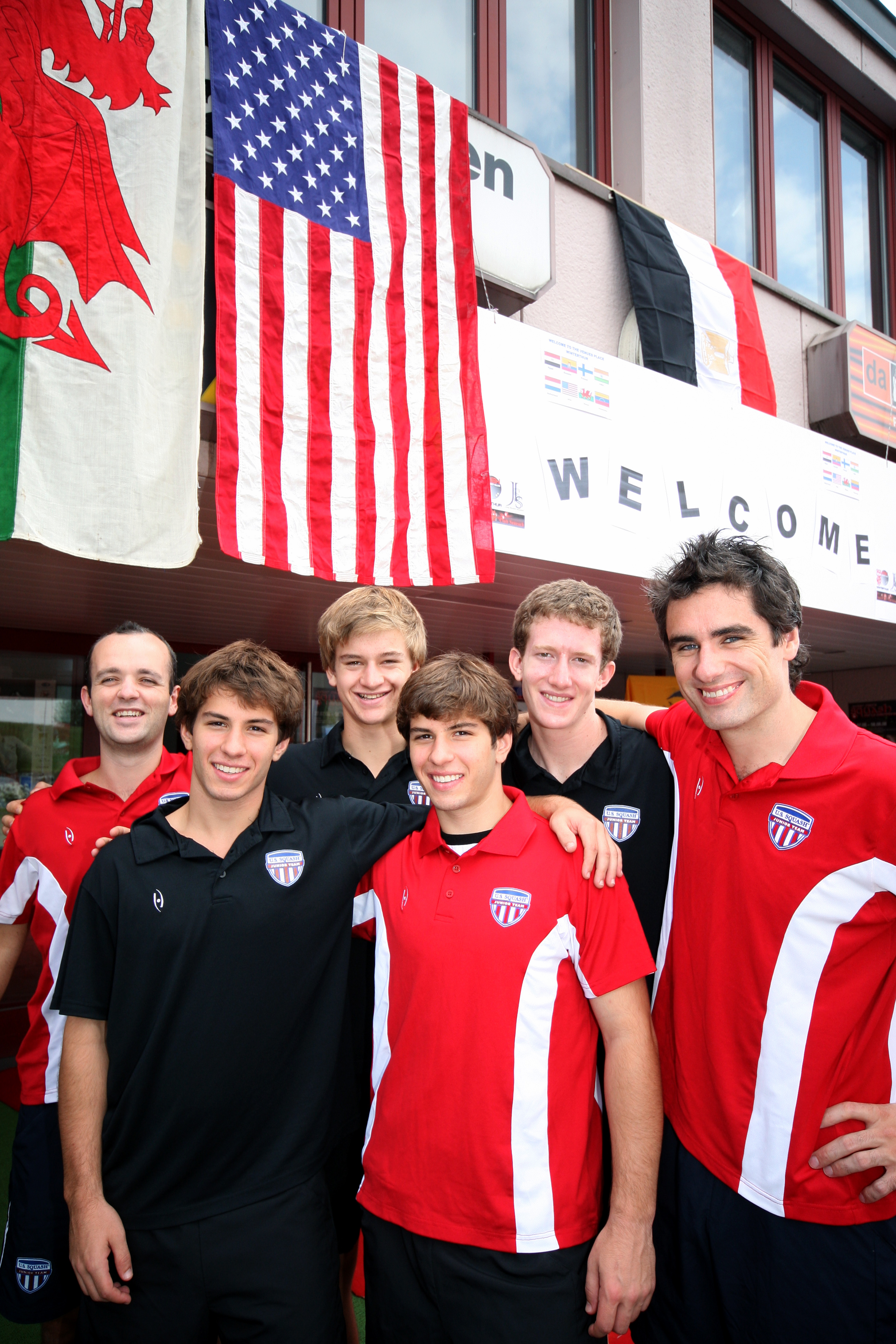By Scott Leighton
Photos by Steve Line/SquashPics.com

A few days before the individual competition kicked off the 2008 World Junior Men’s Championships in Zurich, Switzerland, the US Junior Men’s team spent a day sightseeing by taking a ferry across scenic Lake Lucerne and hiking to the top of Mount Pilatus. This activity inadvertently symbolized the goal of the US Junior Men’s team here in Switzerland—climb the mountain to reach the zenith of the Junior Men’s squash world.
While reaching the very top of the mountain was not a realistic goal, what with junior powerhouses Pakistan and Egypt in the field, the US team wanted to match the success of their predecessors in 2002. That team, lead by current members of the US Men’s team, Julian Illingworth and Christopher Gordon, finished in seventh place, the best-ever finish for a US Junior Men’s team in the World Junior Men’s Championships. The 2004 and 2006 teams, however, were not able to build on that success, finishing in the 14th and 13th positions respectively. This year’s team, coached by Martin Heath and Adam Hamill, went to Switzerland with hopes of achieving results closer to the 2002 team, growing as aspiring squash players, and coming away with an important life experience by representing their country in international competition.
Successes came early for the US team, as US No. 1 Todd Harrity had a triumphant run in the Individual competition. As the only returning member of the 2006 team, Harrity had the most experience of his teammates playing in international competition. This experience, in addition to his success in US tournaments, served him well in the Individual competition where he unexpectedly reached the round of 16. The major upset occurred in the third round, where Harrity defeated Egyptian Wael Farag (a 9/16 seed) in a close four-game match. Harrity’s steady drives and balanced play frustrated his dangerous Egyptian opponent. Although he would ending up losing his next match to the top seed (eventual finalist Aamir Atlas Khan), Harrity had proven his mettle and surprised many in the international squash community with his successful run.
Other individual results included a strong performance from Clay Blackiston, winning two matches to emerge from the qualifiers into the main draw where he defeated Michael Ernst of the Netherlands before being knocked out by Egypt’s Andrew Shoukry in the second round. Alex Domenick and Thomas Mattsson also won first round matches.
The US also had surprising success against the No. 1 team in their pool, India. The Indian team, seeded No. 5 in initial team seeding against the 12th-seeded Americans, escaped with a 2-1 victory. After Harrity defeated India’s No. 1, Vikram Malhotra, in four games and Mattsson was defeated in three games, Alex Domenick lost a close encounter with Aditya Jagtap in a match that went the maximum five games. While the US team was obviously disappointed to have such a huge upset fall through the cracks, Coach Martin Heath was his typically optimistic self in describing his team’s performance in the match. “It was a wonderful performance from all players.” said Heath. “Todd Harrity had to dig deep to weather the uninhibited shot-making of Vikram Malhotra in one of the best matches of the event, Todd winning 3-1. At No. 2 string, Alex Domenick was 2-1 up in the deciding match, almost producing a huge win over 16-year-old wunderkind Aditya Jagtap, though couldn’t quite close it out. While any loss is disappointing, all the players can be proud of their performances, and they gave us confidence moving into the playoff rounds.”
India would end up finishing in fourth place overall in the team event, demonstrating how close the US really is to breaking into the top five in the world.
After the high of nearly upsetting India in pool play, the US lost another close match to sixth seeded Malaysia with Alex Domenick winning the only US point at the No. 2 position. The US would then defeat South Africa and New Zealand to set up their final match of the competition against Australia in the nine/ten playoff. Unfortunately, the US would lose their third 2-1 score of the event by putting up a tenacious fight against a feisty Australian team, finishing in tenth place overall. Harrity again proved his stature in the tournament by winning all his matches in team competition except for a four-game loss to Malaysian No. 1, Ivan Yuen.
Overall, Coach Martin Heath was happy with play in the team competition. “A top 10 finish was our primary goal for the Championships, which was never going to be easy from being seeded 12,” commented Heath. “Wins against South Africa and New Zealand, countries that have a long tradition of excellence in squash, show that the US Team is highly competitive on the world’s stage. Our results against India and Malaysia show that we may have had chances against the teams finishing in the top eight, though ultimately it was a satisfying result.”
With top American athletes in other sports participating in the Beijing Olympics this summer, these young Americans were thrilled to be representing their country in Switzerland. While the team may have finished 10th overall, this number doesn’t properly indicate the successes that they accomplished as a whole in Switzerland. With 2-1 losses to the fourth and fifth ranked teams in the tournament, the US was only one match away from reaching the top eight in team competition. These team accomplishments, along with Harrity’s exceptional performance in the individual Championships, should have American squash fans optimistic toward a possible top-eight finish in the near future. While the US may not be at the top of the mountain yet, they are certainly well on their way.

Todd Harrity, the Top U.S. Junior, Reflects on Switzerland
Our three weeks spent in Switzerland were three weeks not to be forgotten. Each day brought new opportunity, excitement, and surprise. We arrived in Zurich on July 20th, a full week before the competition began. For our first few days we stayed at a hotel near the Vitis Squash Venue (the venue for the Championships). During this time we had an organized practice schedule to get used to the courts and acquaint ourselves with the facility. We found that the courts were very warm and lively so it helped to get used to these conditions. A practice match against the Swiss team was also scheduled during our first few days. We all benefited from good match play!
Later in the week, we packed our bags and traveled to Lucerne to take take in some of the spectacular Swiss scenery. We all took a ferry across Lake Lucerne to have lunch and reach Mount Pilatus. The Canadian team also joined us for the outing. A trolley car carried us up the steep mountain side to the top. After a ten minute hike from the drop off we reached the peak and witnessed the most incredible view of the mountains. Many of them were snow capped and it was beautiful!
We went on another hike later in the week and even took a swim in a small lake fed by mountain water. The water was so cold that some of us treated it as an ice bath to relieve the soreness in our legs.
All these activities before the tournament built an incredibly strong team spirit among all the players. We had a lot of fun and we knew it would be a great experience to play together in the competition.
Shortly after, it was time to return to Zurich for the commencement of the World Junior Championships. The qualifying rounds took place on Sunday. Chris Hanson, Adam Perkiomaki, Nick Sisodia, and Clay Blackiston all had qualifying matches. As we expected, the Vitis Squash facility was packed! Over one hundred fifty players from thirty seven countries arrived in Zurich for the tournament and the arena was filled to capacity. It was amazing to see and meet players from all different nations and backgrounds. From Australia, to India, to Egypt, to England, to Pakistan, to New Zealand, to South Africa, to Venezuela, to the United States – these and many more countries were represented at the competition. But despite the strikingly diverse backgrounds and cultures of all the players, there was one universal language: Squash. Over the course of the tournament we spoke with many other players about squash. We traded jerseys with players from all countries and it was fun to be a part of the greater international squash community.
The tournaments went well for the Americans! Matt Domenick was the runner-up in the Classic Plate. In the team event the United States finished in the top ten out of thirty two teams, and we had an incredibly close 2-1 loss to India who placed fourth in the event.
When it was time to leave we were all ready to go home. Everyone was tired and excited to get back to the U.S. and enjoy our family, friends, and American food! Surely we all will take a lot with us from this experience. What a powerful feeling, to represent the United States at the World Championships!
“Todd was really one of the surprise packages of the event, producing performances that gained the recognition and respect of all players and coaches. His win over 5/8 seed Wael Farag was an epic match, and it was great to see the way that Todd subtly adapted his style of play to the court conditions and different opponents. Not only his play, but his demeanor on and off court was and is world class, a great role model for the younger players wanting to reach the highest level.”
—Martin Heath
Having the word “the” put before your name in the form of a nickname is a form of kudos rarely attained. It shows your uniqueness, and the amount of respect people have for you. The Todd has attained just that respect. We could call him Todd, of course we could. After all, the nickname started off to avoid ambiguity when The Todd was on the U.S. Junior World’s team two years ago with Todd Ruth. Of course two things should be noted. Firstly, The Todd was chosen out of the two to be called “The Todd” when either one, technically could have been called it. Secondly, this nickname, “The Todd” has stuck for two years now and it doesn’t look like it’s stopping anytime soon. Every time I think The Todd’s nickname is a little over the top, The Todd baffles me in ways I never could have imagined. The Todd placed top 16 in the world juniors, beating Wael Farag a 9/16 seed. Cries of “YEAAHHH THE TODD” and “TODD YOU’RE MY HERO” could be heard echoing throughout the squash center. It was truly a remarkable sight. It was a day for America as we celebrated his victory with shouts of “USA,” having just watched the Todd dismantle an Egyptian player many had expected to win. The Todd beat another 9/16 seed in the team event, Viktram Malhotra, for the third time this year, in a steady four games, despite the court lights going off at a very convenient time for the tired India #1! The Todd continued to dazzle us in the team event winning every single match with the exception of one, proving to be the solid foundation of the US’s team. Sometimes matches would be over in 25 minutes, and we would ask “whom did he just play?” and it would be “oh just the number one from south Africa.” Wow. Impressive stuff. Oh did I mention he’s # 1 on his school’s tennis team as well as cross country team? Yeah, don’t underestimate The Todd.
World Junior Men’s Championships Dominated by Egypt and Pakistan

In the years since Ahmed Barada became the first Egyptian to win the World Junior Men’s Individual Championship in 1994, only twice has a country other than Egypt supplied the winning player. Those would be 1998 when Malaysia’s Ong Beng Hee defeated Wael El Hindi (another Egyptian) and 2002 when England’s James Willstrop knocked off his teammate, Peter Barker. Considering the fact that prior to 1994 the Individual final featured a grand total of zero Egyptians, the country’s run of winners has been remarkable.
And 2008 was no different. Despite being seeded No. 2, Egypt’s Mohamed El Shorbagy defeated Pakistan’s top-seeded Aamir Atlas Khan (nephew of the legendary Jansher Khan) in a 75-minute final. After dropping the first game for just two points, Shorbagy powered back into the match and ultimately celebrated victory with both of his parents cheering him on.
“This is a very special moment,” said the ecstatic 17-year-old from Alexandria. “I was up 8-5 in the third and had to make a big push. This was a once in a lifetime chance. The last two titles have been won by Egypt (Ramy Ashour in 2004 and 2006), and there was a lot of pressure on me to win it.”
For 18-year-old Khan, who reached the semifinals in both 2004 and 2006, the loss put an end to his hopes of becoming the first Pakistani to win the coveted title since his uncle won it in 1986. But the bitter taste also provided added incentive for the team event in which Pakistan was seeded No. 2 behind Egypt.
That incentive proved to be powerful when, less than a week after his disappointing individual final, Khan crushed Shorbagy in just 48 minutes (7), 2, 1, 1, to lead Pakistan to the Team Championship over Egypt.
The team title was a case of double revenge for Pakistan since Egypt had beaten them in the team final in 2006. It was the two nations’ third successive meeting in the final and by winning, Pakistan became just the third country to win the Team Championship at least four times (joining England with four and Australia with five).





